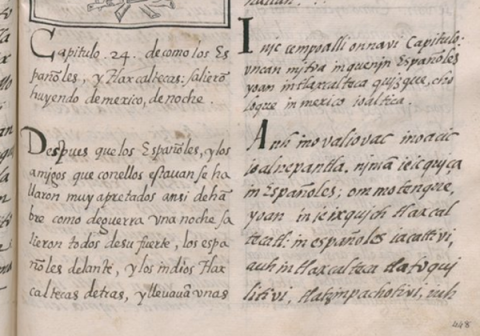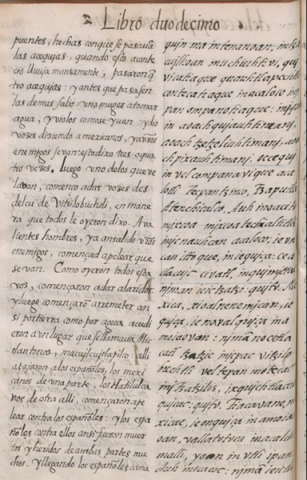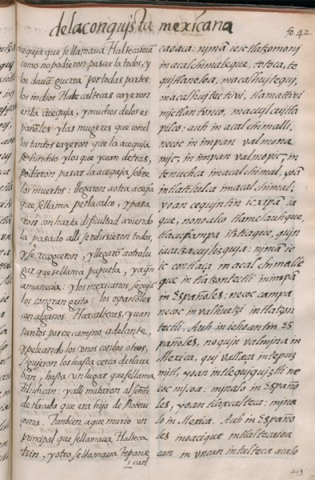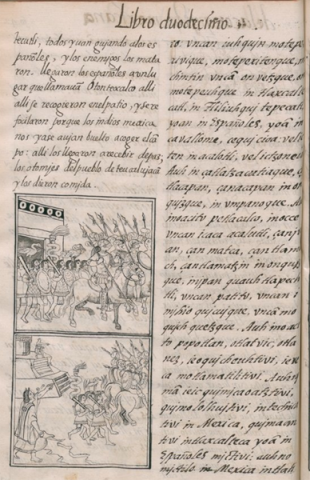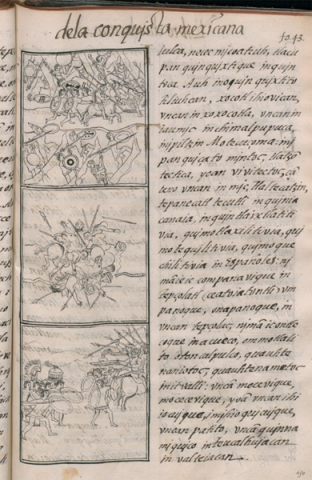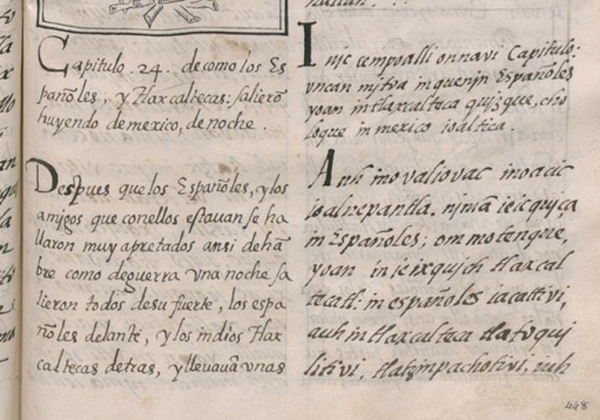 |
[Transcription of the Nahuatl (right-hand column) by James Lockhart:]
[f. 41r., cont.] Inic cempoalli onnavi Capitulo: vncan mitoa in quenin Españoles yoan in tlaxcalteca quizque, choloque in mexico ioaltica.
Auh in ovaliovac in oacic ioalnepantla. nimā ie ic quiça in Españoles: ommotenque, yoan in ie ixquichtlaxcaltecatl: in españoles iacattivi, auh in tlaxcaltecatlatoquilitivi, tlatzinpachotivi, iuh
|
[Translation of the Nahuatl (right-hand column) by James Lockhart:]
Twenty-fourth chapter, where it is said how the Spaniards and Tlaxcalans came out and fled from Mexico by night.
When night had fallen and midnight had come, the Spaniards came out. They formed up, along with all the Tlaxcalans. The Spaniards went ahead, and the Tlaxcalans went following, bringing up the rear, like
[Translation of the Spanish (left-hand column) by James Lockhart:]
Chapter Twenty-four, of how the Spaniards and Tlaxcalans left Mexico fleeing at night.
After the Spaniards and the friends who were with them saw themselves sorely pressed by hunger as well as battle, one night they all came out of their fort, the Spaniards ahead, the Tlaxcalan Indians behind. They carried some
|
[Translation of the Nahuatl into Spanish by Fr. Bernardino de Sahagún; transcription of the Spanish (left-hand column) by James Lockhart:]
[f. 41r.] Capitulo .24. de como los Españoles, y Tlaxcaltecas: salierō huyendo de mexico, de noche.
Despues que los Españoles, y los amigos que con ellos estauan se hallaron muy apretados ansi de hābre como de guerra vna noche salieron todos de su fuerte, los españoles delante, y los indios Tlaxcaltecas detras, y lleuauā vnas
|
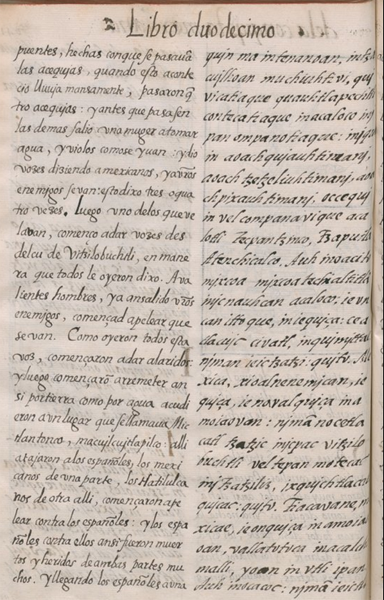 |
[Transcription of the Nahuatl (right-hand column) by James Lockhart:]
[f. 41v.] dequin ma intenanoan, intzacuilhoan muchiuhtivi, quivicatiaquequauhtlapechtli contecatiaque in acaloco in ipan ompanotiaque:
in iquac in aoachquiauhtimani, aoachtzetzeliuhtimani, aoachpixauhtimani, oc cequi in vel companaviqueacalotli Tecpantzinco, Tzaputla Atenchicalco. Auh in oacito mixcoatechialtitlā* inic nauhcan acaloco: ie vncan ittoque, in ie quiça: ce atlacuic civatl, in quimittac: niman ie ic tzatzi: quito. Mexica, xioalnenemican, ie quiça, ie navalquiça in amoiaovan: nimā no ce tlacatl tzatzic in icpac vitzilobuchtli vel tepan motecac in itzatziliz, ixquich tlacatl quicac: quito. Tiacavane, mexicae, ie onquiça in amoiauoan, vallatotoca in acalchimalli, yoan in vtli ipan.
Auh in ocacoc: nimā ie ic tla
----------
*MIXCOATECHIALTITLĀ. The first part of the word, “mixcoa-,” is inadvertently repeated in the manuscript.
|
[Translation of the Nahuatl (right-hand column) by James Lockhart:]
their wall of protection. [The Spaniards] went carrying a wooden platform [or platforms]; they laid it down at a canal and crossed over on it. At this time it was drizzling and sprinkling, the rain was gently dripping down. They were able to cross some other canals, at Tecpantzinco, Tzapotla, and Atenchicalco. But when they got to Mixcoatechialtitlan, at the fourth canal, there they were seen coming out. It was a woman fetching water who saw them; then she shouted, saying, “Oh Mexica, come running, your enemies have come out, they have emerged secretly!” Then another person shouted, on top of [the temple of] Huitzilopochtli; his crying spread everywhere, everyone heard it. He said, “Oh warriors, oh Mexica, your enemies are coming out, let everyone hasten with the war boats and on the roads!”
When it was heard, there was a clamor.
[Translation of the Spanish (left-hand column) by James Lockhart:]
bridges already made, with which they crossed the canals.
When this happened, it was raining gently. They crossed four canals, but before they could cross the rest a woman went out to fetch water and saw that they were going; she shouted, saying, "O Mexica, your enemies are leaving!" She said this three or four times. Then one of those who were standing watch started shouting from the cu of Huitzilopochtli, so that everyone heard him, saying, "O brave men, your enemies have come out; begin the fight, for they are leaving."
When they all heard this shout, they began to give war cries, and then they started attacking, both by land and by water. They ran to a place called Mictlantonco Macuilcuitlapilco; there they headed off the Spaniards, the Mexica from one direction, the Tlatelolca from the other, and there they began to fight against the Spaniards and the Spaniards against them. Thus many were killed and wounded on both sides.
When the Spaniards reached a
|
[Translation of the Nahuatl into Spanish by Fr. Bernardino de Sahagún; transcription of the Spanish (left-hand column) by James Lockhart:]
[f. 41v.] puentes, hechas con que se pasauā las acequias,
quando esto acontecio lluuia mansamente, pasaron q̄tro acequias: y antes que pasasen las demas salio vna muger a tomar agua, y violos como se yuan: y dio vozes diziendo a mexicanos, ya v̄r̄os enemigos se van: esto dixo tres o quatro vezes. Luego vno de los que velavan, començo a dar vozes desdel cu de Vitzilobuchtli, en manera que todos le oyeron dixo. A valientes hombres, ya an salido v̄r̄os enemigos, començad a pelear que se van.
Como oyeron todos esta voz, començaron a dar alaridos: y luego començaro arremeter ansi por tierra como por agua acudieron a vn lugar que se llamaua Mictlantonco, macuilcuitlapilco: alli atajaron a los españoles, los mexicanos de vna parte, los tlatilulcanos de otra alli, començaron a pelear contra los españoles: y los españoles contra ellos ansi fueron muertos y heridos de ambas partes muchos.
Y llegando los españoles a vna
|
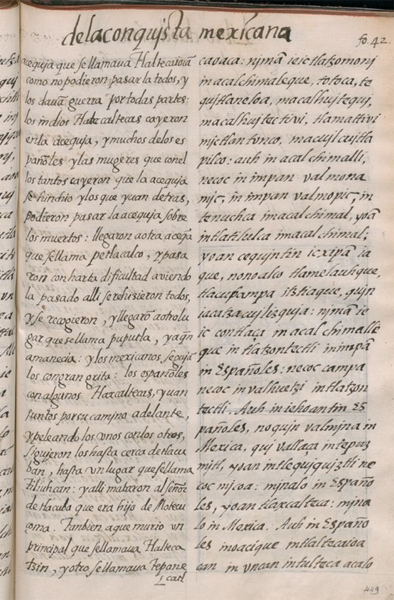 |
[Transcription of the Nahuatl (right-hand column) by James Lockhart:]
[f. 42r.] caoaca: nimā ie ic tlatzomoni in acalchimaleque, totoca, tequitlaneloa, macalhuitequi, macalhuitectivi, tlamattivi mictlantonco, macuilcuitlapilco: auh in acalchimalli, necoc in impanvalmonamic, in impan valmopic, in tenuchca imacalchimal, yoā in tlatilulca imacalchimal; yoan cequintin icxipā iaque, nonoalco tlamelauhque, tlacupampa itztiaque, quiniacatzacuilizquia: nimā ie ic contlaça in acalchimalleque in tlatzontectli in impā in Españoles: necoccampa necoc in valhuetzi in tlatzontectli. Auh iniehoantin Españoles, no quinvalmina in Mexica, quivallaça in tepuzmitl, yoan in tlequiquiztli necoc micoa: minalo in Españoles, yoan tlaxcalteca: minalo in Mexica.
Auh in Españoles in oacique in tlaltecaioacan in vncan in tultecaacalo
|
[Translation of the Nahuatl (right-hand column) by James Lockhart:]
Everyone scrambled; the operators of the war boats hastened and paddled hard, hitting each other’s boats as they went in the direction of Mictlantonco and Macuilcuitlapilco. The war boats came upon them from both directions; the war boats of the Tenochca and the war boats of the Tlatelolca converged on them. And some people went on foot, going straight to Nonoalco, heading toward Tlacopan to try to cut them off there. Then the war boat people hurled barbed darts at the Spaniards; from both sides the darts fell on them. But the Spaniards also shot at the Mexica, shooting back with iron bolts and guns. There were deaths on both sides. Spaniards and Tlaxcalans were hit, and Mexica were hit.
When the Spaniards reached Tlaltecayoacan, where the Tolteca canal is,
[Translation of the Spanish (left-hand column) by James Lockhart:]
canal named Tlaltecayocan, because they could not all get across and they were being attacked from all sides, the Tlaxcalan Indians fell in the canal, along with many of the Spaniards, and the women who were with them. So many fell in that the canal filled up, and those who came behind were able to cross the canal on top of the dead.
They reached another canal, named Petlacalco, and crossed it with great difficulty. Having crossed it, they all reorganized themselves, collected their strength, and reached another place called Popotla when, dawn was already coming.
The Mexica followed them with great shouting. The Spaniards, with some Tlaxcalans, went ahead together on their way, each side fighting with the other. They followed them as far as close to Tacuba, to a place called Tiliuhcan, and there they killed the lord of Tacuba, who was a son of Moteucçoma. Here died also a leader named Tlaltecatzin, and another named Tepanecatl
|
[Translation of the Nahuatl into Spanish by Fr. Bernardino de Sahagún; transcription of the Spanish (left-hand column) by James Lockhart:]
[f. 42r.] acequia que se llamaua Tlaltecaiocā como no podieron pasarla todos, y los dauā guerra por todas partes: los indios Tlaxcaltecas cayeron en la acequia, y muchos de los españoles y las mugeres que con ellos tantos cayeron que la acequia se hinchio y los que detras, podieron pasar la acequia sobre los muertos:
llegaron a otra aceq̓a que se llama petlacalco, y pasaron con harta dificultad aviendola pasado alli se rehizieron todos, y se recogieron, y llegarō a otro lugar que se llama puputla, ya q̄n̄* amanecia:
y los mexicanos seguiālos con gran grita: los españoles con algunos Tlaxcaltecas, yuan juntos por su camino adelante, y peleando los vnos con los otros, siguieronlos hasta cerca de tlacuban, hasta vn lugar que se llama Tiliuhcan: y alli mataron al señor de tlacuba que era hijo de Motecuçoma. Tanbien aque** murio vn principal que se llamaua Tlaltecatzin, y otro se llamaua Tepanecatl
----------
*Q̄N̄ . For "quando."
**AQUE. For "aqui."
|
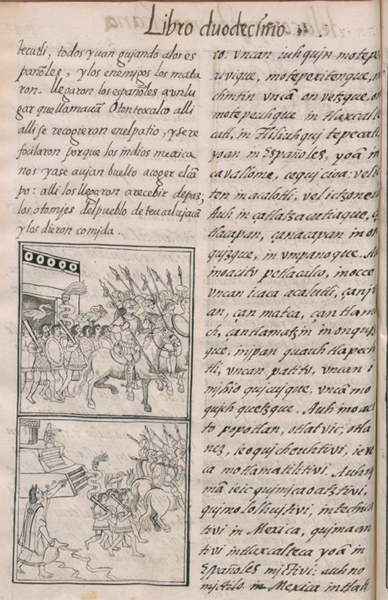 |
[Transcription of the Nahuatl (right-hand column) by James Lockhart:]
[f. 42v.] co: vncan iuhquin motepexivique, motepexitenque, mochintin vncā onvetzque, ommotepeuhque in tlaxcaltecatl, in Tliliuhquitepecatl, yoan in Españoles, yoā in cavallome, cequi cioa: vel icten in acalotli, vel ic tzoneuh. Auh in ça tlatzacutiaque, ça tlacapan, ça nacapan in onquizque, in vmpanoque.
Auh in oacito petlacalco, in oc ce vncan icaca acalutli, çan ivian, çan matca, çan tlamach, çan tlamatzin in onquizque, in ipan quauhtlapechtli, vncan patito, vncan imihio quicuique, vncā moquichquetzque. Auh in oacitopopotlan, otlatvic, otlanez, ie oquicheuhtivi, ie veca motlamatilitivi.
Auh nimā ie ic quimicaoatztivi, quimololhuitivi, intech icativi in Mexica, quimaantivi in tlaxcalteca yoā in Españoles mictivi: auh no mictilo in Mexica in tlati
|
[Translation of the Nahuatl (right-hand column) by James Lockhart:]
it was as though they had fallen off a precipice; they all fell and dropped in, the Tlaxcalans, the people of Tliliuhquitepec, and the Spaniards, along with the horses, and some women. The canal was completely full of them, full to the very top. And those who came last just passed and crossed over on people, on bodies.
When they reached Petlacalco, where there was yet another canal, they passed gently, slowly, gradually, with caution, on the wooden platform. There they restored themselves, took their breath, regained their vigor. When they reached Popotlan, it dawned, light came. They began to go along with spirit, they went heading into the distance.
Then the Mexica went shouting at them, surrounding them, hovering about them. They captured some Tlaxcalans as they went, and some Spaniards died. Also Mexica and Tlatelolca were killed;
[Translation of the Spanish (left-hand column) by James Lockhart:]
teuctli. All of them were going along guiding the Spaniards, and the enemies killed them.
The Spaniards reached a place called Otonteocalco; there they took shelter in the courtyard and regained their strength, because the Mexica Indians had already gone back to pick up the spoils. There the Otomis of the settlement of Teocalhueyacan approached them to receive them peacefully, and they gave them food.
|
[Translation of the Nahuatl into Spanish by Fr. Bernardino de Sahagún; transcription of the Spanish (left-hand column) by James Lockhart:]
[f. 42v.] tecutli, todos yuan guiando a los españoles, y los enemigos los mataron.
llegaron los españoles a vn lugar que llamauā Otonteocalco alli* se recogieron en el patio, y se refocilaron porque los indios mexicanos ya se auian buelto a coger el cāpo: alli los llegaron a recebir de paz; los otomies del pueblo de teucaluiacā y los dieron comida.
----------
*ALLI. The word is inadvertently repeated in the manuscript.
|
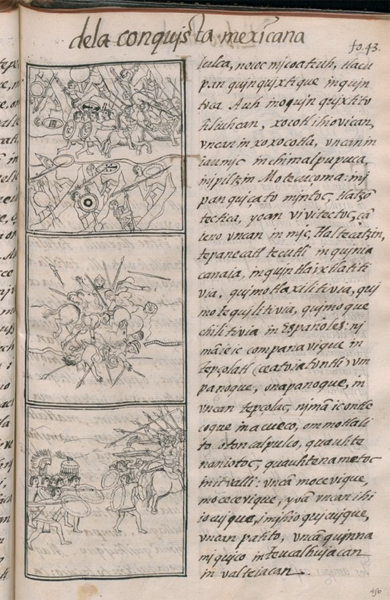 |
[Transcription of the Nahuatl (right-hand column) by James Lockhart:]
[f.43r.] lulca, necoc micoatiuh, tlacupan quinquixtique in quintoca. Auh in oquinquixtito Tiliuhcan, xocotlihiovican, vncan in xoxocotla, vncan in iaumic in chimalpupuca, in ipiltzin Motecuçoma: in ipan quiçato mintoc, tlatzōtectica, yoan vivitectoc, çā ie no vncan in mic, Tlaltecatzin, tepanecatl tecutli in quiniacanaia, inquintlaixtlatitivia, quimotlaxilitivia, quimotequilitivia, quimoquechilitivia in Españoles:
nimā ie ic companavique in Tepçolatl (ce atoiatontli) vmpanoque, onapanoque, in vncan Tepçolac, nimā ic ontlecoque in acueco, ommotlalito otoncalpulco, quauhtenaniotoc, quauhtenametoc in itvalli: vncā mocevique, mocecevique, yoā vncan ihiiocuique, imihio quicuique, vncan patito, vncā quinnamiquico in teucalhuiacan in valteiacan.
|
[Translation of the Nahuatl (right-hand column) by James Lockhart:]
there was death on both sides. They drove and pursued [the Spaniards] to Tlacopan. And when they had driven them to Tiliuhcan, to Xocotliiyohuican, at Xoxocotla, Chimalpopoca, son of Moteucçoma, died in battle. They came upon him lying hit by a barbed dart and struck [by some hand weapon]. At the same place died Tlaltecatzin, a Tepaneca lord who had been guiding the Spaniards, pointing out the way for them, conducting them, showing them the road.
Then they crossed the Tepçolatl (a small river); they forded and went over the water at Tepçolac. Then they went up to Acueco and stopped at Otoncalpulco, [where] wooden walls or barricades were in the courtyard. There they all took a rest and caught their breath, there they restored themselves. There the people of Teocalhueyacan came to meet them and guide them.
[Translation of the Spanish (left-hand column) by James Lockhart:]
(intentionally blank)
|
[Translation of the Nahuatl into Spanish by Fr. Bernardino de Sahagún; transcription of the Spanish (left-hand column) by James Lockhart:]
[f. 43r., tres dibujos; sin texto en español]
|
